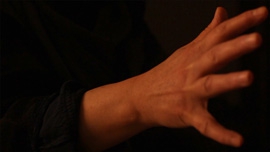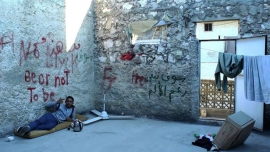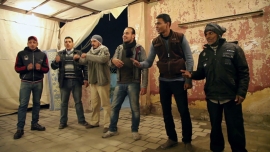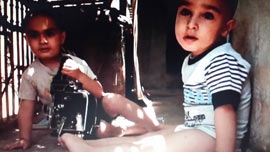"If I think about the future of cinema as art, I shiver" (Y. Ozu, 1959)
Lulu Shamiyya
Sunday, 07 June 2020 18:14Corpo estraneo
Sul finire della luce pomeridiana, un ponte. Appare sbilenco, scarno, con gambette essenziali che a malapena sorreggono. Qualcosa mi attira verso di lui, devo accelerare la pedalata per andare incontro a questa secchezza, questa precarietà. Sembra abbandonato, sembra che impronte umane non ve ne siano da secoli. Vedo solo l’impronta della luce, calda, che si accinge a scendere verso il tramonto. Mi sta di fronte, questa desolazione. Sbilenca, parzialmente illuminata.
Faccio un giro di pedale in più, mi avvicino. Adesso anche la luce che fende è più vicina, anzi è l’unica certezza di quest’incontro. Questa luce ha un calore, apro la bocca per inghiottirlo tutto con un unico gesto osceno.
Sembra che qualcosa debba avvenire, mentre ingoio questo sorso bollente.
O sarà la notte ad inghiottire me…
O sarà il corpo ad incepparsi, ad incastrarsi nel meccanismo, a rimanere nell’ingranaggio...
Gli vado incontro. Qualcosa dice che bisogna pure lasciar accadere, evitare di frenare, lasciar fare alla gravità.
Gli vado incontro su questo ponte scarno, che a malapena sorregge.
Non penso che sia così disgustoso. O meglio, penso che nel suo essere disgustoso sarà eccitante. Penso a quale delle mie parti attivare prima. Mi viene istintivo di cacciare un dito, afferrare qualcosa di sicuramente umido, intingere in qualcosa di sicuramente umido. Immergo il dito in quest’umidità. Tiro fuori qualcosa di organico. Ho tutta la bocca piena del sorso che faccio cadere a poco a poco, saliva che scende piano, si ferma attorno al corpo estraneo e lo circonda. Inizia piano, con una lieve lubrificazione in modo che il ponte sbilenco non traballi troppo. A mano a mano che si rianima, tutto prende consistenza e fiducia.
Stendo tutto il mio corpo per bene sul ponte, faccio in modo che il mio orifizio anale combaci per bene con il pavimento freddo e sbilenco. Il contatto eccita. La precarietà eccita.
Guardo in faccia al corpo estraneo che, investito dalla luce pomeridiana ormai virata in tramonto, diventa sempre più pesante e voluttuoso. Diventa sempre più invasivo ed esigente.
Aspetto che in una sola mossa decisa, senza troppe esitazioni senza indugi pensieri preliminari affetti preamboli raggiri, ma con una sola sicura menefreghista pugnalata scenda a picco su di me, invada me. L’impatto mi fa godere. Per la violenza del colpo il ponte sbilenco già traballante va in mille pezzi, insieme ai miei liquidi, alle mie certezze.
Entrare nel corpo estraneo è la calamità del secolo.
Almeno non morirò nella secchezza.
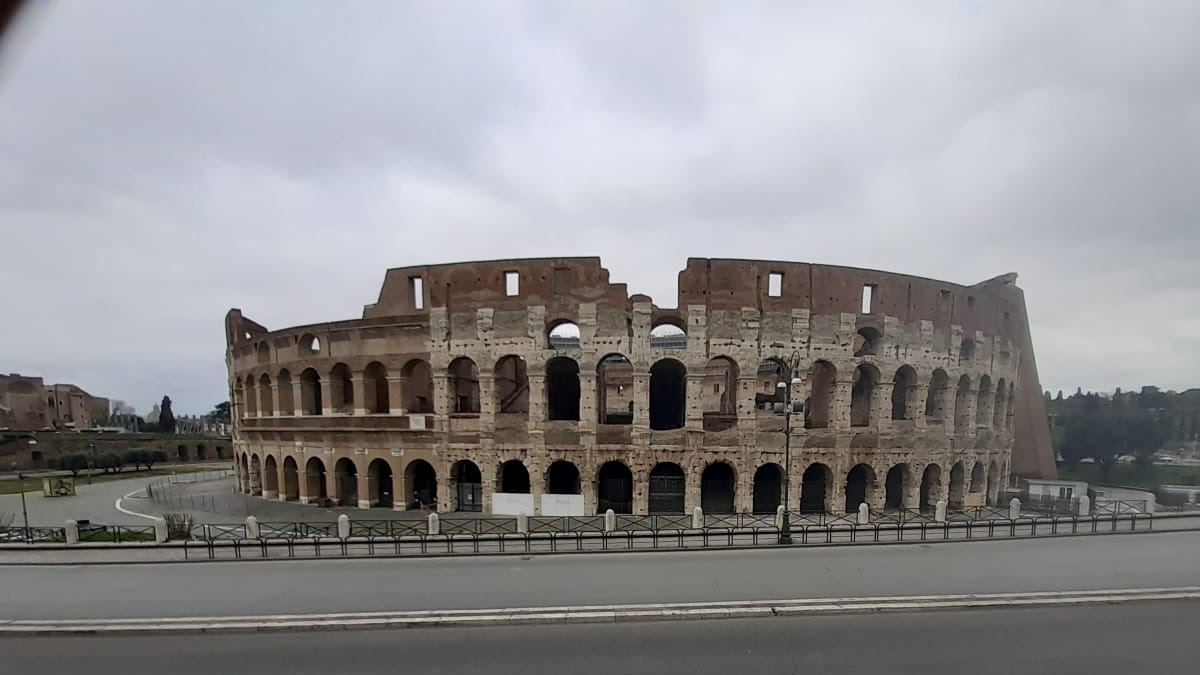
FUTURE OF CINEMA (1) - Chaos (Sara Fattahi)
Sunday, 02 December 2018 18:57Lulu Shamiyya
300 Miles (Orwa al Mokdad)
Monday, 21 November 2016 09:55Faraway, so close: filming distances
Lulu Shamiyya
300 Miles is a film that tells about distances. Orwa al Mokdad, the filmmaker, comes from Daraa, the hub of the March 2011 uprising. Like many young people from his generation, he cannot go back to his home town. The closest he can get inside Syria is to rebel-held Eastern Aleppo. The closest he can get is to a computer screen where he watches the innocent gaze of his eight-year-old niece Nour dialing in from Daraa. Through home-made videos uploaded for her young uncle she points out at “the destruction that is happening in Syria”.
Here's Daraa, southern Syria, a city where children do not go to school anymore. Instead, they watch their fathers dressed in military fatigues embracing kalashnikovs to protect their homeland against the brutality of a regime aiming to kill anyone who's not sharing his political views.
Here's Aleppo, northern Syria, a city that has been divided and destroyed by war and hatred. His young students who used to protest peacefully for human rights and a more dignified life now have to leave the university campus to extremist groups wanting to transform a place for knowledge into a place for submission.
In Daraa, Nour hangs out with her little portable camera to show Orwa the remainders of life. “You see, uncle, the tree that you used as a swing is no longer”.
In Aleppo, Orwa's restless camera follows a group of peaceful activists left alone with their ideals and very few other things: cigarettes, coffee, and a big disillusion vis-à-vis those who encouraged “the peaceful revolution”...Enthusiastic Western activists, NGOs, the facade of several governments, a high-principled yet totally paralyzed public opinion..those who supported the revolution until it fitted a nice TV shot, colorful street parades and chants, witty slogans and dances..until the revolutionaries seemed to be “like us”, no beards and secular-looking.. until it was convenient to invite these youth to drink tea and eat petit fours at a two-day workshop hosted in a five-stars hotel. Orwa's camera promptly captures the gaze of Adnan, one of the “respectful”, peaceful activists, while throwing a poster of a feel-good, dialogue-oriented conference on the floor, before being obliged to leave Aleppo with his comrades for the unknowns of exile.
Nobody can bear this hellish Aleppo, divided into opposition, regime, anti-regime, anti-opposition and god knows what. Nobody but Abu Yarub, a commander from the so-called “Free Syrian Army” that people barely remember. Orwa's camera patiently approaches him, trying to establish a dialogue with him. “Why are you still here, what are you fighting for”, he asks the stubborn commandant-in-chief who looks more and more like a Don Chisciotte fighting for an idea: the original, genuine idea of the revolution. But fighting whom? Fighting for what?
300 Miles is a film about distances. Not only geographical distances. Not only the distance dividing Orwa from little Nour, from his home town, that the magic of technology can bring closer, ghosts on the screen, blurred pixels animating the filmmaker's desire of homecoming.
A human distance. A distance marking the new geography of Syria. How far from each other are people like Abu Yarub, Adnan, Orwa himself? How far is the idea of a revolution which used to unite them all under a common ground, a shared ideal? How far is 2011 from the dark times that we are currently experiencing?
How far away is the time when we used to call it a “spring”; when we used to salute the energy of these grassroots movements and cherish their desire to change their world, our world? 300 Miles hints at this distance. A distance from an idea of a revolution which we ourselves, NGOs, respectful public opinion and governments, used to support until it was comfortable to do so, and which now we have left alone. Faraway, so close, Orwa al Mokdad's camera restlessly registers this failure: the failure of the images that have desperately tried to convince us spectators of the genuine face of an uprising. Nour is left alone uploading pixels and pixels of surreal daily life in Syrian, while Abu Yarub still fights against windmills, whether under the name of Isis or that of Bashar al-Asad. Adnan and his friends leave silently, walking toward exile, while Orwa's camera stays steady, trying to capture whatever life is left in his country descending into hell.
Out on the Street ( Jasmina Metwaly and Philip Rizk)
Tuesday, 27 October 2015 15:05Tout va bien in Egypt
Lulu Shamiyya
I get to watch Jasmina Metwaly and Philip Rizk’s Out on the street (Barra fel shari', 2015) in a post-revolutionary summer in Cairo. Tahrir Square is few miles away. I can just imagine the sound of the silence coming from down there: the silence of the everyday life that seems to be back on track. Today, out on the streets of Cairo there’s nothing than just the usual chaos of a megalopolis’ daily routine emptied from the imprévu once brought by a different kind of chaos, that of the revolution. Yet Out on the street reminds me that things never sleep in Cairo, not even the revolution.
A group of working-class men is invited on a Cairo rooftop to join an acting workshop aiming at staging a mise-en-scene of their factory and the power dynamics revolving around it. Police brutality, corruption, abuse of power, exploitation of the workers by their employers, threats of loosing jobs and being put out on the street: everything emerges during the rehearsals, everything is filmed by Metwaly and Rizk’s discreet camera. Quite soon the space of fiction given to the workers to recreate their daily struggle turns into a real space. Once being understood, the mechanism of exploitation is replicated and reproduced by the workers on other workers, as if it were the most natural thing: the mise-en-scene of the abuse becoming the abuse itself. Like in the hall of mirrors, exploitation is exercised from capital on the worker, and from the worker on another worker, and then on another worker, too. The filmmaker is there to witness and document, but has also to join the struggle.
This reminds of another factory, another time, another class struggle. France, 1972: Jean-Luc Godard and Jean-Pierre Gorin had just filmed Tout va bien, a caustic account of a strike at a sausage factory. At the time, Godard said in an interview1 that he was interested in looking at the social forces simultaneously at work in the same physical space: capital, the working-class, but also the leftists, the engaged intellectuals. One of Godard and Gorin’s main focus in Tout va bien was, in fact, the role of themselves as filmmakers in narrating the workers’ struggle and finding ways to support it. That is why Tout va bien is not so much a film about a workers’ rebellion against capital; rather, it documents the efforts of two engaged intellectuals in approaching this very struggle through cinema. How do we turn a revolution into a filmed image, into a spoken word, without having that same image, that very word betraying the revolution itself? How can a representation not violate the thing represented?
In the aftermath of the 2011 uprising, Metwaly and Rizk, who are members of the media collective Mosireen, raise this question again by asking the Egyptian workers to be their own metteurs en scene. Visually the film mixes together different sources of material (fictional performances taken from the acting workshop, interviews with the workers, personal mobile footage shot by a former factory employee). But what really blurs the line between factual and fictional, between the representation and the thing represented is the workers’ own mise-en-scene of their working condition, of the exploitation they are exposed to which they unconsciously get to replicate. Godard’s words in 1970s France resonate in 2010s Egypt: “the very medium we use was, up until now, in the hands of those we're fighting right against. Therefore, despite our good intentions, we don't completely control it”.
There were millions of cameras switched on the Egyptian revolution in 2011. The medium was in the hands of the people: yet, who controls the images of the revolution once they are generated? Who keeps them, preserves them, and makes use of them?
“Who directs today in France, who is the metteur en-scene” asked Godard in 1972.
“How dare we trade in images of resistance” asks Mosireen in Egypt 2011.
The charm of Metwaly and Rizk’s film lies in the question it raises about their own role as activists and filmmakers. It is as if they could not decide whether being with the workers and supporting the latter’s mise-en-scene to create a narrative of their oppression in order to counter-act the will of the exploiters to put them out on the street again, jobless and without dignity. Yet, at the same time, we feel that they would rather, as filmmakers and activists, be themselves out on the street, looking for the right image, for the right to the image. The one image that would not generate a cycle of “an industry of empathy”2, compassion, pity, solidarity with the revolution; but would, instead, drag more bodies out in the street.
2 Mosireen, Revolution Tryptich, p. 48 in "Uncommon Grounds: New Media and Critical Practice in the Middle Est and North Africa" edited by Anthony Downey, I.B. Tauris 2014
FESTIVAL/Berlinale 2015 Expanded - La Dolce Siria (Ammar al-Beik)
Sunday, 22 March 2015 17:07Lulu Shamiyya
Ultimi articoli pubblicati
- 2025-03-24 Chime/Cloud/Serpent’s Path (Kurosawa Kiyoshi)
- 2025-03-24 Abiding Nowhere (Tsai Ming-liang)
- 2025-03-24 The Box Man (Gakuryū Ishii)
- 2025-03-24 Grand Tour (Miguel Gomes)

